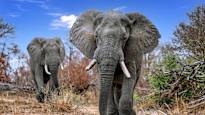The decisions made by the governments of the countries about, among other things, the slaughtering of elephants, zebras and hippopotamuses for food arouse strong reactions in the world for and against.
In the southern parts of the African continent, the drought is now so bad in some places that the government of a few countries there have announced that they have to kill hundreds of wild animals in order to get food for their starving inhabitants, says the news channel CNN.
Namibia announced in August that it had started the slaughter of 723 animals. Among them were 83 elephants, 30 hippos and 300 zebras. In September, Zimbabwe gave permission to kill 200 elephants. The government of both countries justified their decision by saying that hunting wild animals helps alleviate the effects of the region’s worst drought in a hundred years. Problems have arisen, for example, when thirsty and hungry animals have ventured closer and closer to human settlements in search of water and food.
Conservationists have criticized the slaughter of wild animals as cruel and short-sighted. They have also been said to set a dangerous precedent.
Criticism and questions about the government’s motives have also been raised by Namibia’s decision to offer part of the country’s elephants to trophy hunters. Hunting tourists, mostly from the United States and Europe, are willing to pay thousands of dollars to shoot wild animals just to get their body parts as hunting souvenirs.
In the opinion of the supporters of the slaughter, the critics have at least misunderstood nature conservation and are at worst “racists” who value wild animals before people and want to dictate to African countries how they should act.
“The suffering is endless”
The situation in southern Africa is very serious in many places. Crops have failed, livestock has died and nearly 70 million people are in dire need of food. Zimbabwe declared a national emergency in April. Namibia did the same in May as about half of the country’s population suffered acute food shortages due to drought.
The main culprit of the drought is the weather phenomenon El Niño. Intermittent changes in the ocean current in the Pacific Ocean have led to a sharp decrease in rainfall in southern Africa. The situation is worsened by human-caused climate change.
– The unprecedented increase in drought is a fact, deputy director of the UN Environment Program Elizabeth Mrema told CNN.
– The suffering is endless.
Mreman reminds us that legally hunting and eating wild game is a common practice around the world.
– As long as the animals are killed using scientifically proven, sustainable methods, there should be no cause for concern.
Source: CNN
